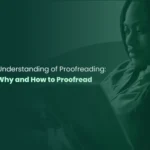The Ultimate Guide to Designing a Successful Author Website

With digital media intruding on the latest marketing practices, an author’s online presence marks significance in deciding the future success of their book. Other than marketing on social media platforms, what could be the next?
Think!
The answer is: Designing a Successful Author Website.
A well-designed author website can be a powerful marketing tool, helping you connect with readers, promote your work, and establish your brand. However, creating an effective author website requires careful planning and design. This guide will walk you through the essential steps to designing a successful author website.
Create a Goal Statement
Having specific objectives is necessary before developing your author’s website design. Ask yourself a question about what you want to achieve with the website. Do you want to tell people about your new book, make contacts in the literary community, or share information about your work? Website layout and content should reflect your objectives.
Choose a Web Address (URL)
Your chosen domain name will be the address or URL of your author’s website. It should contain your name or pen name, making it simple to remember and type. If you want people to remember you, but your name is already taken, adding “author” or “books” will help.
Choose a Website Maker
Many website design options exist, including WordPress, Wix, and Squarespace. You may make a website that looks professional using these platforms, even if you don’t know how to code, by using one of their many templates and modifying it to your liking.
Author Website CTA
Transform Your Online Presence Now - Enlist Our Expert Author Website Design and Development Services
Consult Now
Make a Website Template
Keep your intended readers in mind while you create your author’s website. The layout ought to be appropriate for the writing you do. For instance, a dark and ominous look may be suitable for a writer of thrillers. Writing romance may call for a more airy layout.
Make Useful Documents
Include these sections on your author’s website:
- The homepage is the initial page that users encounter. It would help to have a short bio, a picture, and book links up there.
- This website provides readers with additional information about the writing process.
- Books: This page is where you may promote your books and provide links to where readers can buy them.
- Keep a blog to keep your readers informed about your writing progress.
- Include a contact form here so site visitors may contact you.
You need to SEO-optimize your site.
Search engine optimization (SEO) is necessary to get more people to visit your website. Your website’s text and meta descriptions should include keywords relevant to your authoring. Writers of historical fiction, for instance, would do well to target searches for “historical fiction author” and “historical novels.”
Readers and authors alike need to be able to distinguish fiction from Nonfiction. It not only allows us to delve more deeply into the realm of words but also helps us appreciate the variety and depth of literature. Both fiction and Nonfiction have something to offer readers, whether it’s the objective truth and information of reality or the imaginative escape and recreation of fiction. Accept the potential of language, and set off on a literary journey tailored to your interests and goals.
Don’t Skimp on the Pictures
Using high-quality photos may increase your website’s overall aesthetic. To have high-quality photographs of your books and headshots for your About page, you might think about hiring a professional photographer.
Connect your social media accounts.
Directing readers to your social media accounts may build a following and raise awareness of your writing. Think about including share buttons for various social media sites.
Optimize Your Site for Mobile Use
Because of the prevalence of mobile internet use, it is crucial that your website renders properly and displays appropriately when viewed from a mobile device.
Update Regularly
Keep your website current with all of your most recent works. Search engines like Google reward sites that are often updated with new content.
Concluding Remarks
In conclusion, a website dedicated to your authorship should be a priority if you want to reach out to readers and promote your work. You can make a successful author website by setting goals, selecting a memorable domain name, choosing a website builder, designing your website with your audience in mind, creating essential pages, optimizing for SEO, using high-quality images, including social media links, making your website mobile-friendly, and updating frequently. Have fun putting your ideas into action!
Recent Posts
 Audio Book vs Reading: Which is better?In a world where stories come alive through printed words and spoken narratives, a fierce debate has captivated book lovers: audio books vs. reading. .... .......
Audio Book vs Reading: Which is better?In a world where stories come alive through printed words and spoken narratives, a fierce debate has captivated book lovers: audio books vs. reading. .... ....... A Complete Checklist of Book Genres: Unfolding the 35 Popular Book GenresCurious about what's beyond your bookshelf? Prepare to be amazed as we unveil 35 popular book genres, each opening doors to a world of suspense, wonder, and excitement. .... .......
A Complete Checklist of Book Genres: Unfolding the 35 Popular Book GenresCurious about what's beyond your bookshelf? Prepare to be amazed as we unveil 35 popular book genres, each opening doors to a world of suspense, wonder, and excitement. .... ....... What is Proofreading? Why It Is Important? and How to Do It?
What is Proofreading? Why It Is Important? and How to Do It?What is Proofreading
Proofreading is the process of comparing designed book pages to copy-edited text. .... ....... 6 Steps To Designing A Book Cover That Stands OutDon't judge a book by its cover, but a good cover can make a difference. In this blog post, you will learn the art of designing a book cover that stands out in the crowded literary market........
6 Steps To Designing A Book Cover That Stands OutDon't judge a book by its cover, but a good cover can make a difference. In this blog post, you will learn the art of designing a book cover that stands out in the crowded literary market........ How Many Different Types of Book Editing Exist?Do you want to learn the secrets of book editing? In this blog post, you will discover the different types of book editing services and how they can transform your manuscript into a masterpiece........
How Many Different Types of Book Editing Exist?Do you want to learn the secrets of book editing? In this blog post, you will discover the different types of book editing services and how they can transform your manuscript into a masterpiece........




